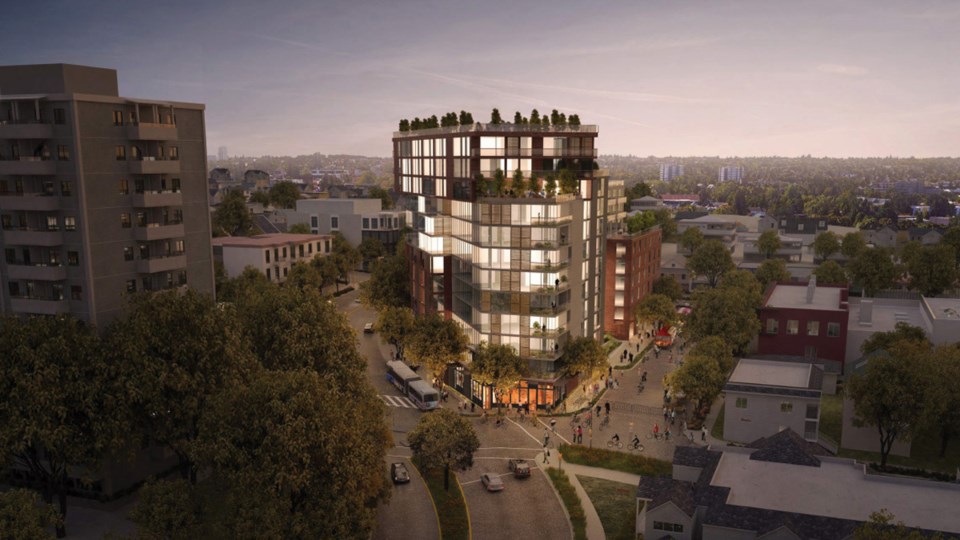Last week, new renderings of a proposed high-rise development located along Commercial Drive were released. Critical comments began to appear on news websites featuring the images almost on queue.
It is too tall! It does not conform to our community! We are losing heritage! Developer greed is driving this! Private money should not support social housing! Land prices will rise higher!
Less frequent, but just as predictable, are the critics of the critics.
You are all NIMBYs! You do not understand how developments work here! You are against the poor!
Proponents of the Kettle/Boffo planned development at the intersection of Commercial Drive and Venables are probably not enjoying being in the middle of the latest Vancouver mud toss over density.
A “No Tower” campaign erupted last year in the surrounding neighbourhood, complete with lawn signs and an online campaign.
“Do you want to hand the future of our community over to developers?” asks the author of the anti-Kettle development website.
Naturally, “developers” are not happy being the perennial bogeyman for Vancouver activists. But they have themselves partly to blame for the toxic state of community relations in our city.
On the face of it, the Kettle Boffo development would seem to have the hallmarks of a housing project that could be viewed as an improvement to its surroundings.
At 12 storeys, the building is slightly shorter than the neighbouring Adanac Towers, and it has a shape and setbacks to make the mass of the structure less imposing at the street level.
The new development will allow the Kettle Society — a non-profit that has filled an important community need for mental health services for almost four decades — to expand and renew its services.
Social housing is incredibly important to our city’s residential mix, and a true expression of Canadians’ compassion.
But like with so many large developments before it, the Kettle Boffo project was met with suspicion and derision even before a design was presented to the public. Some speculated the building would be much taller than 12 storeys.
So-called “fishing expeditions” where proponents push for higher density are a common tactic that inevitably produces a backlash. When the final design is presented — most often with reduced height — it is meant to signal that the developer has listened to criticism.
The developments usually then go ahead after creating a wake of bitterness in surrounding communities.
In Vancouver, it has been the way to do business for years, and it has left citizens, elected officials, city staff and developers all frustrated.
NPA Coun. Elizabeth Ball captured the feeling perfectly in a recent newspaper interview.
“From almost all the people I talk to, Vancouver seems to be a city under immense stress,” said Ball. She and her fellow councillors often have their backs to the wall in council chambers as development opponents line up to register their opposition.
Even the staunchest development critics will admit Vancouver must continue to grow. Our real estate prices are a direct result of high demand and low supply.
So how can we build more housing minus the confrontation?
In the past, Vancouver has shown that it can be done.
King Edward Village, located at the intersection of Kingsway and Knight Street, is a rare example of when a community embraced density in return for much-needed amenities such as a grocery store and public library.
In that example, a group of community volunteers met regularly with city staff to explore how to make King Edward Village a “win” for the surrounding neighbourhood.
Success came when the developer and the community found common ground.
Under the leadership of then co-directors of planning Larry Beasley and Ann McAfee, community groups were consulted on development proposals.
It is the group setting that provides the creative “spark,” which helps overcome planning hurdles and gives the city and development proponents much-needed social capital to continue.
Imagine a scenario where instead of dragging yourself to another development open house — or shaking your fist at city council — you look forward to shaping your community’s future.
Can it happen again in Vancouver? Perhaps, but in nearly eight years governing our city the Vision government has not demonstrated that they have consultation as part of its DNA.
For a system that feels like it is broken, inviting true community input is an obvious fix.
mike@mikeklassen.net
@MikeKlassen



